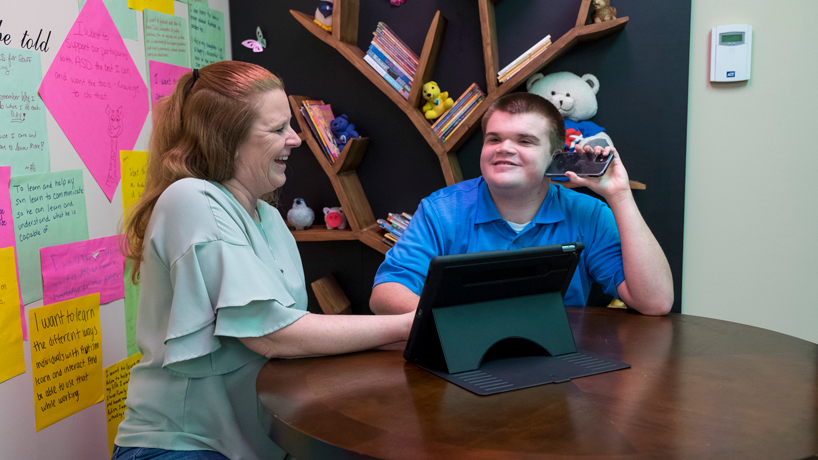
Adam Morgan, a nonspeaking autistic person, struggled to communicate and be truly included in the classroom before receiving an iPad at 10 years old. Now, he’s pursuing a BES with an emphasis in entrepreneurship in the College of Education. His fight for autonomy inspired his mother, Rachel Morgan, to found the Adam Morgan Foundation, a nonprofit to support inclusive opportunities for neurodiverse individuals. (Photo by August Jennewein)
At 10 years old, Adam Morgan found his voice.
That’s when his mother, Rachel Morgan, got him an iPad to use as an augmentative and alternative communication device. For the first time, he could truly express himself as a nonspeaking autistic person.
“I started typing my own thoughts and making my own choices,” Adam says.
While some people judged him or held low expectations initially, Adam has worked since then to prove how wrong they were, shattering preconceived notions and forging a path for others like him.
He’s now pursuing a BES with an emphasis in social entrepreneurship in the College of Education at the University of Missouri–St. Louis.
He’s also created a YouTube channel called “Tech Talk with Adam Morgan,” contributed to the book “Leaders Around Me: Autobiographies of Autistics who Type, Point, and Spell to Communicate” and done consulting work through the Adam Morgan Foundation, a nonprofit founded by Rachel to support inclusive opportunities for neurodiverse individuals.
Adam’s experiences inspired Rachel to earn master’s and doctoral degrees in education, and she has since served as an instructor at UMSL.
“I was tired of being told I was just a mom, and I didn’t know what I was talking about,” she says. “They can’t say that anymore.”
Before using his iPad, Adam utilized a picture exchange communication system to express himself as best he could. The system relies on choosing from a handful of simple picture boards, a process that severely limits nonspeaking people’s ability to truly share their thoughts or feelings.
Typing his first word was a revelation.
It spurred him to help others find their voices through the Adam Morgan Foundation’s Apple a Day Program, which has provided more than 400 iPads and computers to neurodiverse individuals in the St. Louis region.
The organization got its start providing equipment such as net swings, pressure vests and weighted blankets to families. Rachel saw the need for such resources while working as a service coordinator with Missouri First Steps, the state’s early intervention program for young children with disabilities. She’d taken the position after Adam’s birth to become more well versed in the disability field.
“All the services and supports are in the home until a child is 3,” she says. “But once they’re 3, they move onto the school district, and all the services and supports are taken out of the home.”
Believing there should be a better transition that maintained home support, Rachel launched the foundation in 2008. Since then, it has provided equipment to more than 1,000 families in the St. Charles and St. Louis areas and expanded its services to include access to technology, an annual conference, training videos and workshops. It has also funded more than 100 weeks of specialty and inclusion camps.
Most recently, the organization piloted a program with funding from the Developmental Disabilities Resource Board of St. Charles County to provide 20 adults with disabilities technology training that focuses on functional tasks such as creating an email address and learning email etiquette, online banking, managing and scheduling their own appointments, social media safety and learning to apply for jobs online.
Thus far, it’s been a success, but the very need for it exposed a gap in modern life for many adults with disabilities.
“We, at the Adam Morgan Foundation, presume competency versus incompetency,” Rachel says.
Adam faced similar doubts when he started using his iPad.
Because he types with the help of a communication partner – sometimes a teacher or tutor but most often his mother – the teachers and administrators at his middle school remained dubious about his ability to type and think on his own.
Adam explains that the communication partner’s hand grounds him and helps quiet his anxiety, allowing his brain and body to connect and get his thoughts out. It’s a motor issue, not a cognition issue, and he communicates in a different way, not in a lesser way.
Those conditions made school fraught for Adam, and though he’d found a way to express himself, people still infantilized him. However, after moving to Fort Zumwalt East High School, he found a supportive environment.
“When someone believes in you, anything is possible,” he says. “It all starts at home. My mom believed in me, and she helped the educators believe in me. My teachers were amazing, and for the first time, I felt truly included.”
In 2020, he graduated with excellent grades and delivered the class commencement speech via a digitally vocalized recording.
“I felt like I had a good message to share,” he says. “When I was picked, I couldn’t believe it. I was so ecstatic.”
When it came time for college, Adam had several options, but he felt at home in the educational studies program at UMSL. He’s continued to find supportive educators such as Theresa Coble, the E. Desmond Lee Endowed Professor of Experiential and Family Education.
Coble led a blended format “Social Entrepreneurship” course structured around student pitches on ventures to solve societal problems, and Adam thrived, taking the lead on his group’s semester-long project.
“It was great to work in a group and collaborate with others on this project,” Adam says. “It helped me see other perspectives and allowed us to come up with the campaign and educational videos to meet people where they are.”
Adam plans to keep making an impact once he graduates, encouraging others to follow their dreams. If he can do it, he knows they can, too.
“I want to run the foundation,” Adam says of the future. “I want to write more books and be a motivational speaker.”
This story was originally published in the spring 2022 issue of UMSL Magazine. If you have a story idea for UMSL Magazine, email magazine@umsl.edu.














